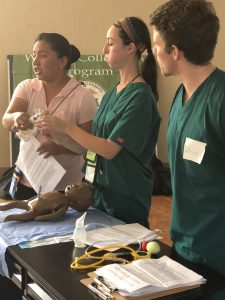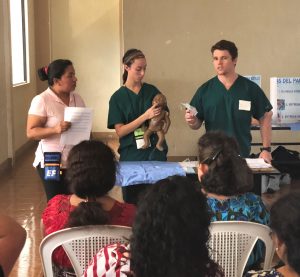The PA Foundation awarded Wagner College PA Program a 2017 Robert K. Pedersen Global Outreach Grant for its project designed to curb the infant mortality rate in Guatemala. The project incorporates a “train-the-trainer” approach that equips PA students to become educators of neonatal resuscitation techniques.
 In January 2018, 40 Wagner College PA students and faculty members completed a two-week visit to indigenous Mayan communities in the remote Lake Atitlan region of Guatemala. The team invited local women and midwives (comadronas) to attend student-led training sessions focused on the “Helping Babies Breathe” neonatal resuscitation education program.
In January 2018, 40 Wagner College PA students and faculty members completed a two-week visit to indigenous Mayan communities in the remote Lake Atitlan region of Guatemala. The team invited local women and midwives (comadronas) to attend student-led training sessions focused on the “Helping Babies Breathe” neonatal resuscitation education program.
The sessions covered a wide range of topics including recognizing signs of distress, safely clearing an infant’s airway, performing compressions on newborns, and using assisted airway ventilation. To make the sessions interactive, PA student trainers utilized “Helping Babies Breathe” manikins to demonstrate proper suction and chest compressions. The interactive portion was well-received by the comadronas, who appreciated having sufficient time to practice and ask questions about the techniques and tools.
At the end of the trainings, birthing kits and manikins were distributed to the comadronas to enable them to incorporate the techniques into their practice. The PA-led team also distributed pre- and post-training surveys to participants in order to measure their knowledge before and after the training session.
Over the course of the two-week visit, the Wagner team trained 43 midwives and provided them with supplemental “Helping Babies Breathe” materials and birthing supplies. All of the midwives trained were able to demonstrate competency with hands-on resuscitation techniques after the training. In addition, the post-training surveys demonstrated an increase in knowledge and comfort level with the new techniques.
In addition to the comadronas, the Wagner team oversaw approximately 2,000 patient encounters during the two-week visit focused on distribution of birthing and newborn supplies to local women.
 The project was not without its share of challenges. The Wagner team had access to only a few Mayan translators, which proved problematic since some of the midwives only spoke the indigenous Mayan language. Along with the language barrier, limited literacy posed a challenge when it came to completion of pre- and post-training surveys. The Wagner team acknowledges that if they could go back and tweak their approach, they would have procured more translators and recruited more students in order to facilitate a one-on-one teaching experience with each midwife.
The project was not without its share of challenges. The Wagner team had access to only a few Mayan translators, which proved problematic since some of the midwives only spoke the indigenous Mayan language. Along with the language barrier, limited literacy posed a challenge when it came to completion of pre- and post-training surveys. The Wagner team acknowledges that if they could go back and tweak their approach, they would have procured more translators and recruited more students in order to facilitate a one-on-one teaching experience with each midwife.
The project team’s goal is to make the neonatal resuscitation program both sustainable and replicable. The Wagner PA program has sent a team of students and faculty to Guatemala on an annual basis for the last four years. Having implemented the train-the-trainer model during their last visit, the team plans to return to the same Guatemalan communities to gauge the midwives’ knowledge after instituting the teaching program, with hopes that they have educated other midwives. The team also plans to expand the program into other Latin American countries, with Peru next on the list.
The PA Foundation is proud to support this PA-led project that is making a sustainable contribution to health education and patient health outcomes in an underserved community.

